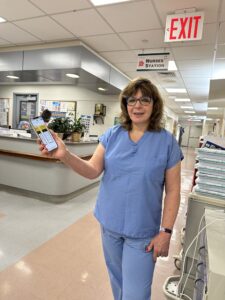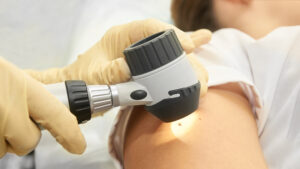Childbirth can be an exciting, joy-filled experience. But for millions of pregnant patients every year, labor and delivery presents potentially dangerous health complications. Catching the warning signs of adverse events early can significantly change outcomes.
Maimonides Medical Center is leading the way for these early detection efforts. By introducing Medical Brain®, an artificial intelligence (AI)-fueled clinical decision support system, to obstetrics and gynecology (OB/GYN), the hospital has dramatically reduced the number of “never events” — those adverse occurrences providers strive to prevent for pregnant patients.
“Labor and delivery is very dynamic. A lot is happening at the same time, so things can very quickly go from normal to problematic for mom and baby,” said Scott Chudnoff, MD, Chair of Obstetrics and Gynecology at Maimonides. “With Medical Brain, we have a tool that allows us to identify trends or detect when something negative is about to occur. It’s an early warning system that alerts us to critical events so we can step in to ensure the safety of our patients.”
Five years ago, Maimonides began using the Medical Brain AI system for OB/GYN care, making us the first hospital nationwide to implement AI in OB/GYN. This level of experience makes our OB/GYN clinical experts leaders in leveraging AI technology to deliver the highest quality of care for our patients.
What is the Medical Brain at Maimonides?

Dr. Shoshana Haberman, Director of Maternal-Fetal Medicine, utilizing the Medical Brain system in Maimonides’ Labor & Delivery Unit.
Implemented at Maimonides in partnership with medical AI company HealthPrecision, the Medical Brain system produces personalized alerts based on a patient’s reported symptoms and specific health data, pinpointing problems with 99% accuracy.
“This is a high-precision, real-time system that accurately sees and analyzes the clinical picture for a patient and identifies any gaps in care or documentation,” said Shoshana Haberman, MD, PhD, Associate Chair and Director of Maternal-Fetal Medicine and Medical Informatics, noting that the system works for inpatient and outpatient settings. “It uses patient-specific data to alert you to situations that need your attention.”
Using natural language processing, Medical Brain puts into context information gathered from various sources, including electronic medical records, discharge summaries, lab results, diagnostic images, or provider notes. It leverages machine learning, advanced clinical decision support and clinical context engines to analyze this collected data. It assesses the data against existing clinical and practice guidelines, like those of the American College of Obstetrics and Gynecology, Maimonides-specific protocols, and measures from the Centers for Medicare & Medicaid Services.
Medical Brain doesn’t make any clinical decisions. However, it does encourage providers to intervene if it detects any medical situation which needs intervention. The system sends automatic notifications via smartphone to the provider based on protocols and will escalate to higher-level providers if there is no response. The frequency of the alerts is based on the acuity of the situation.
If no one responds within 30 minutes, the system will record it as a “never event,” and will continue to alert the providers and notify departmental and hospital supervisors.
Using Advanced AI to Improve OB
Maimonides introduced Medical Brain to its nursing and medical staff in 2018, testing whether the tool could help reduce the number of “never events” patients experience. They programmed the system to focus on 11 specific problems, like:
- A lack of antibiotics given to group B strep-positive patients in labor
- A lack of magnesium sulfate to prevent seizures in patients with severe preeclampsia
- Not discontinuing Pitocin for patients in labor who have a non-reassuring fetal heart rate
“Based on recorded data, Medical Brain helped reduce these adverse events by nearly 91%,” Dr. Haberman said.
Between June 2018 and May 2022, Maimonides OB/GYNs helped deliver 28,300 babies. Between June 2018 and June 2019, when Medical Brain was first implemented at Maimonides, nearly 118 patients per 1,000 experienced a “never event.” That rate fell to roughly 11 out of 1,000 by May 2022.
“Medical Brain has been extremely successful in reducing these negative — and avoidable — events,” Dr. Chudnoff said. “The unique aspect is that the tool directly interacts with you by phone, page, or text. We never know when problems are going to emerge. If you aren’t actively looking at a patient’s information, you probably won’t see it. Now, with Medical Brain, we can respond to situations in a more meaningful and timely way.”
Making a Meaningful Impact on Care
Currently, in the OB/GYN department, Medical Brain is only available to providers. Maimonides is working to expand the tool to patients. Still, Dr. Chudnoff said it has already made a positive impact on the quality of care patients receive.
These alerts help providers stay more actively engaged with patients in real-time, he said. When providers receive urgent notifications, they can quickly address the need and safeguard the continuum of care for each patient. It’s a change that will lead to better overall patient and provider outcomes.
“This is the beginning of what the future of medicine will look like, and Maimonides is at the forefront,” Dr. Chudnoff said. “As we integrate and utilize computer assistance more, it will lead to better patient management and less time for patients to spend in the hospital or emergency room.”
With a constantly evolving, innovative approach to maternal-fetal medicine, our primary focus is on providing the safest and highest quality care for both mother and baby. This expert obstetric team, comprising dedicated physicians, anesthesiologists, neonatologists, nurses, licensed midwives, doulas, patient care technicians, nutritionists, and lactation consultants, has led the way in MMC’s prestigious designation as a New York State Regional Perinatal Center. Our Reproductive Endocrinology and Infertility Services, Early Pregnancy Assessment Center and newly updated Neonatal Intensive Care Unit round out a full suite of comprehensive services for every step of reproductive, maternal, fetal, and neonatal care.
To make a referral or for more information on obstetric care and labor and delivery at Maimonides, visit our website.




